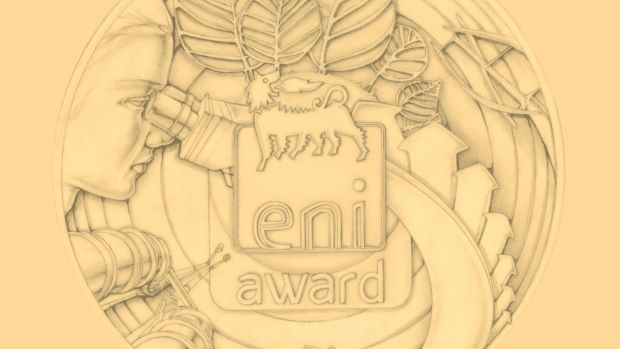
Eni’s scientific research prizes awarded
The Eni Award ceremony was held today at the Quirinal Palace in the presence of the President of the Italian Republic Sergio Mattarella, Eni’s Chairman of the Board of Directors Giuseppe Zafarana and CEO Claudio Descalzi.
This year marks the 16th edition of the award, which is recognised internationally as a benchmark for research in the fields of energy and the environment. It highlights the importance that scientific research and technological innovation have for Eni, as well as its commitment to promoting sustainability and access to energy, in line with the United Nations’ 17 Sustainable Development Goals. There have been over 11,000 applications since it was established in 2008. The Scientific Committee, which assessed the different types of research submitted, is made up of scientists from top global research institutions and has seen the participation of 6 Nobel prize-winners over the years.
Once again this year, through Joule, Eni’s Business School, the company has awarded the Eni Joule for Entrepreneurship special mention. This is meant for teams, university spin-offs, and start-ups focused on the application, enhancement and transfer of technologies aimed at creating a sustainable innovation ecosystem.

The 2024 Eni Awards went to the following winners:
- For the Energy Transition section, which focuses on research in energy efficiency as well as on the capture, utilisation, and storage of carbon dioxide, the award was granted to Marc Fontecave from the College de France (France). Marc Fontecave’s research is aimed at developing technologies to valorise CO2 as an alternative carbon source for producing compounds of high industrial interest. To this end, drawing inspiration from biological systems, he has developed innovative catalytic systems characterised by high efficiency and selectivity and employed in electrocatalytic processes for the reduction of CO2 powered by renewable electricity.
- In the Energy Frontiers section, which honours research on renewable energy sources and energy storage, the award went to Nam-Gyu Park from Sungkyunkwan University (South Korea) for his research on solid-state perovskite solar cells. Through his work, Prof. Park has contributed to the research and development of a new class of materials for photovoltaic devices, which have demonstrated unprecedented advances in efficiency and stability over a short period, even surpassing silicon technology, and are becoming key players in the energy market.
- In the Advanced Environmental Solutions section, dedicated to enhancing scientific and technological innovation for the protection and sustainable use of natural resources, the award was given to Holger Braunschweig from the Julius-Maximilians-Universität Würzburg (Germany) for his research on reducing waste and toxic elements through the direct functionalisation of nitrogen with light elements, without using transition metals. Prof. Braunschweig has shown that certain light elements, such as boron, can facilitate reactions that previously required toxic heavy metals. In particular, his research has achieved significant results in converting molecular nitrogen into ammonia. This breakthrough enables the avoidance of costly purification processes that generate waste, saving substantial amounts of energy while also preventing the environmental and health issues associated with many toxic metals.
In the Young Researcher of the Year Award category, which honours two researchers who have completed their PhDs at Italian universities, the awards were given to Elvira Spatolisano and Stefano Toso.
- Elvira Spatolisano, who completed her PhD at the Politecnico di Milano, conducted a study on the valorisation of hydrogen sulphide, a compound often found in natural gas, the cleanest fossil fuel, which is vital for the energy transition towards renewables. These valorisation processes enhance environmental sustainability by converting toxic waste into high-value products, such as fertilisers or hydrogen.
- Stefano Toso, who earned his PhD at the Università Cattolica del Sacro Cuore in collaboration with the Italian Institute of Technology, researched metal halides, a new class of semiconductors with excellent photovoltaic properties, useful for creating efficient optoelectronic devices. The nanomaterials he developed are expected to find applications in photovoltaics, photocatalysis, and optoelectronics, as well as in emerging fields such as quantum computing.
The Young Talents from Africa section, established in 2017 to mark the 10th anniversary of the Eni Award and dedicated to young talents from the African continent, awarded four prizes this year to Favour Agbajor from the Durban University of Technology (South Africa), Petra Kienyiy Chui from Egerton University (Kenya), Lakhdar Hamidatou from the Ecole Nationale Polytechnique de Constantine (Algeria), and Nomthandazo Precious Sibiya from the Durban University of Technology (South Africa). The winners will receive scholarships enabling them to pursue doctoral studies at prestigious Italian universities, further developing the innovative ideas they formulated during their master’s theses.
- Favour Agbajor has developed innovative models that integrate the design and functioning of buildings with renewable energy systems, aiming for carbon neutrality.
- Petra Kienyiy Chui has assessed the levels and characteristics of microplastics and the water quality of the Njoro River and Lake Nakuru in Kenya.
- Lakhdar Hamidatou has developed and experimentally validated a removable cooling kit for commercial photovoltaic panels, employing phase change materials (PCM) derived from biological sources.
- Finally, Nomthandazo Precious Sibiya has developed a magnetic coagulation separation technique applicable to wastewater treatment.
In the Eni Innovation Award section, which selects the most innovative projects developed by Eni researchers and technical experts, awards were given to:
- Cristina Bonanomi, Rino Bonetti, Silvia Pavoni (Eni), Davide Moscatelli, and Edoardo Terreni (PoliMI) for patenting a process for the production of bio-oil from lignin.
- Riccardo Borgomaneri, Luigi Colombo, Francesca Galimberti, Samuele Gori, Alberto Landoni, Nicoletta Panariti and Rita Ponzo, (Eni) for the innovative technological solution “Bio-Slurry,” a one-stage process to convert highly contaminated bio-feedstocks into valuable products.
- Mirko Barbavara, Gabriele Bianchi, Stefano Cardamone, Lino Carnelli, Davide Deriu, Carla Lazzari, Nicola Mancini, Tamara Passera and Giuseppe Sabetta, (Eni) for the Eni TES (Thermal Energy Storage) technological solution.
The special mention “Eni Joule for Entrepreneurship” was awarded to three startups that distinguished themselves for the innovativeness and sustainability of their proposed business projects:
- HBI – Human Based Innovation, a startup from Bolzano (Italy) which has developed and patented a technology for the circular treatment of sewage sludge.
- SLY, a startup from Santa Caterina dello Ionio (Catanzaro, Italy), which has developed cutting-edge AI technologies for the ultra-early detection and classification of forest fires.
- RarEarth, a startup from Milan, which has developed an innovative chemical process for recycling rare earths from two-wheeler electric motors.
Information Source: Read More
Oil and gas press covers, Energy Monitor, Climate, Gas,Renewable, Oil and Gas, Wind, Biomass, Sustainability, Oil Price, LPG, Solar, Marine, Aviation, Fuel, Hydrogen, Electric ,EV, Gas,

